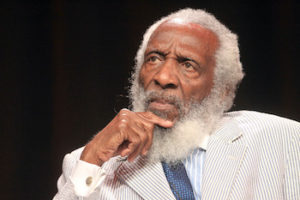
Dick Gregory
Dick Gregory was born on this date in 1932. He was a Black comedian and activist.
Richard Claxton Gregory was born in St. Louis. Raised in poverty, he began working at an early age to help support his family. He was involved in sports and social causes in high school, and he entered Southern Illinois University on an athletic scholarship in 1951, standing out as a middle-distance runner. He was named the university's outstanding student-athlete in 1953, the same year he left college to join the U.S. Army, where he hosted and performed comedy routines in military shows. Gregory began his professional career in 1958 as a master of ceremonies at several Chicago nightclubs.
He achieved national recognition following his debut at the Playboy Club in Chicago in 1961. The one-nigher turned into a six-week stint that earned him a profile in Time magazine and a television appearance on the Tonight Show hosted by Jack Paar. His numerous succeeding television, nightclub, and concert routines targeted poverty, segregation, and racial discrimination. He gained fame as a comedian for his satirical views on American racial attitudes.
Active in the American Civil Rights movement, he came to Selma, Alabama, and spoke for two hours on a public platform two days before the voter registration drive known as "Freedom Day" (October 7, 1963). Gregory began his political career by running for mayor of Chicago in 1967 against Richard J. Daley. Gregory ran for President of the United States in 1968 as a Freedom and Peace Party write-in candidate.
Gregory wrote several books of racial humor; the first was "From the Back of the Bus" (1962). Gregory shocked the country by titling his second autobiography "NIGGER!" (1964). He described his humble beginnings and the racism he experienced at Southern Illinois University in the 1950s.
Gregory was arrested for Civil Disorder during a 1963 civil rights demonstration in Birmingham. He was also an outspoken critic of American involvement in the Vietnam War. In 1968, he believed that the Federal Bureau of Investigation played a role in the assassination of civil rights leader Martin Luther King, Jr.
Gregory's study with Mark Lane resulted in his book "Code Name Zorro" (1978). A congressional investigation disagreed with his theory. "No More Lies: The Myth and the Reality of American History" (1971). In the early 1970s, Gregory abandoned comedy to focus on his political interests, ranging from race relations to violence, world hunger, capital punishment, drug abuse, and poor health care. He generated particular attention for his more than a hundred hunger fasts. At this time, he became a vegetarian, marathon runner, and nutrition expert.
In the 1980s, he began a successful business venture with his nutritional product, the "Bahamian Diet," around which he built Dick Gregory Health Enterprises, Inc. Through his company, he targeted the lower life expectancy of Black Americans, which he attributed to poor nutrition and drug and alcohol abuse.
Now, Gregory was fighting cancer. Southern Illinois University recently inducted him into its Athletic Hall of Fame. Then there was a tribute to Gregory in the nation's capital on October 9, at the Kennedy Center, hosted by the National Council of Negro Women.
At a Civil Rights rally marking the 40th anniversary of the Voting Rights Act, Gregory called the United States "the most dishonest, ungodly, nonspiritual nation that ever existed in the history of the planet. As we talk now, America is 5 percent of the world's population and consumes 96 percent of the world's hard drugs." A week before his death, Gregory was hospitalized in Washington, D.C., with a bacterial infection. He died at the hospital in Washington, D.C., on August 19, 2017, at 84. The cause was heart failure.